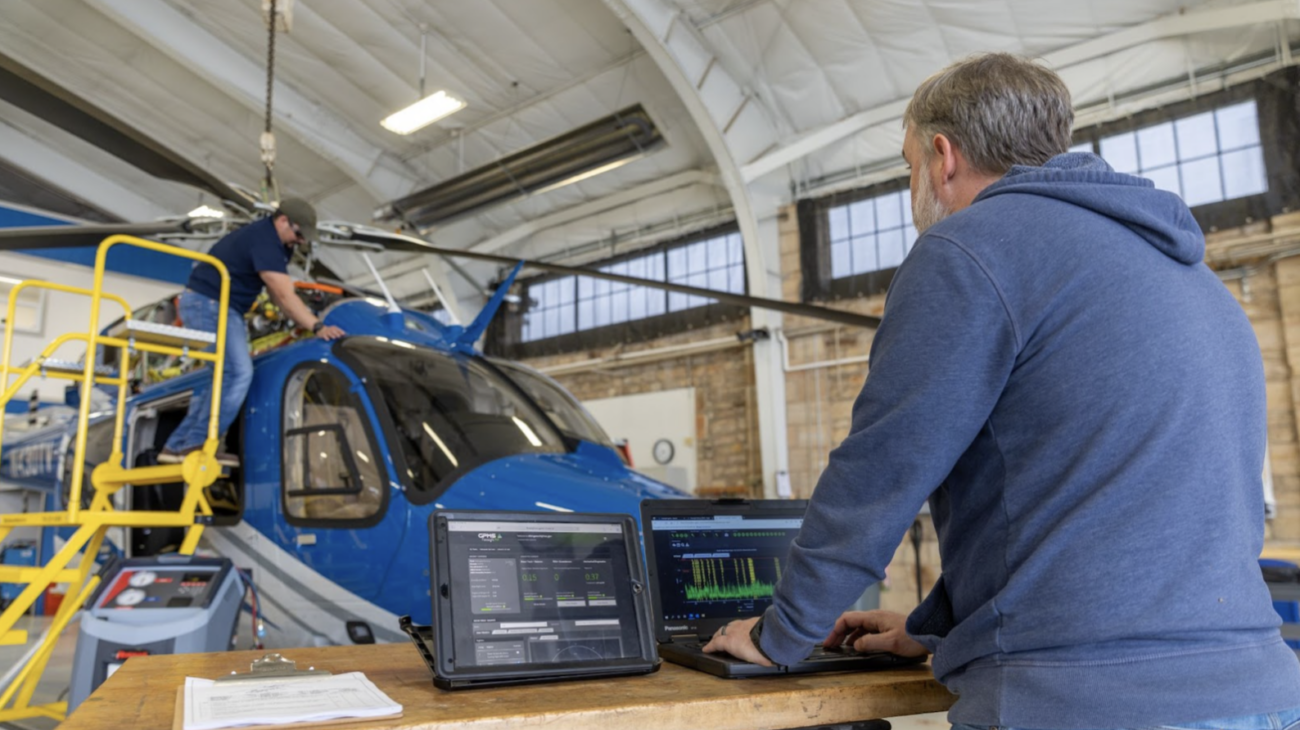
GPMS / Company Spotlight
WATERBURY, VT – GPMS offers a new preventative maintenance solution for helicopters, providing precise information about worn parts and the expected time until replacement.
Founded in 2013 by Eric Bechhoefer and Jack Taylor, both with prior experience at Vergennes-based Goodrich (now Collins Aerospace/Raytheon Technologies), GPMS is redefining condition monitoring, known traditionally as HUMS, within the rotorcraft industry.
“People talk about predictive maintenance, but nobody really has predictive maintenance; what they have is an early detection system,” explained President Jed Kalkstein. “They don’t give people real guidance. Nobody has been successful at it except for GPMS.”
For example, if a bearing begins to wear within a helicopter’s drivetrain, the Foresight system would notify the operator of the issue and provide the remaining time before a necessary repair. Foresight MX can also detect when operators should adjust their flying practices to protect the safety of the aircraft.
“With high-consequence vehicles, if something fails, that can mean a helicopter falling out of the sky,” said Jed Kalkstein. “We’re trying to give maintainers the ability to know what’s going to happen; you want to move unscheduled maintenance into planned windows. Somewhere in the neighborhood of 40 percent of your maintenance is unplanned maintenance.”
In one instance, a customer flew a newly purchased aircraft for 25 hours when Foresight MX identified a bearing issue in the engine. When the fault worsened, the operator engaged with the engine manufacturer, submitted a warranty claim, and resolved the issue efficiently.
“What really excites me is when [customers] see the return on investment,” said VP of Marketing Ronnie Ries. “We’ve caught some things that could have ended up being catastrophic events if they didn’t have this system.”
GPMS is the first company to deliver true predictive maintenance in helicopters. Contrasting with traditional HUMS systems that are bulky, expensive, and labor-intensive for data handling, Foresight MX is lightweight, uses cellular connectivity, and cloud technology.
GPMS has grown to a 20-person team since 2013, attracting some of the brightest minds in the aviation industry. For example, Ries spent nearly two decades at Bell and was running commercial marketing there before joining GPMS; and the VP of Sales, Todd Powers, was one of the top salesmen at Airbus Helicopters.
GPMS launched Foresight MX in 2018 and has since targeted partnerships with OEMs (original equipment manufacturers) like Bell and MD.
“Every time I talk to folks about what we do, the response we hear is, ‘This should be on every aircraft, right?’” said Kalkstein. “The industry is beginning to adopt a more proactive stance with respect to what we’re doing. It’s not so much the regulators (the FAA does occasionally mandate that certain technologies need to be on an aircraft), but rather some of the industry categories are starting to require it.”
Aircraft that fly people to offshore oil platforms are mandated to have a system like Foresight on-board and new contracts from the U.S. Forest Service can also require it. There is also interest among the developers of large capacity drones and eVTOL-aircraft which are being developed around the world.
Ries envisions broader applications for GPMS’s technology beyond helicopters. One successful demonstration for the US Army involved the installation of Foresight on a HMMWV (Humvee) and another is in process now on a logistics support vessel.
GPMS has been picking up momentum, nearly doubling its sales and installations every year for the past couple of years. Most recently, with VCET support, Kalkstein also helped the company conclude its Series B funding round.
“[VCET] has been a fantastic asset to us,” said Kalkstein. “David [Bradbury] introduced us to the people who became the lead investors in the B round [Green Eight Capital]. He’s constantly checking in and has good suggestions on what to do, and that’s been a big help. VCET is another big part of what has made this story work for GPMS in Vermont.”
Looking ahead after the B round, GPMS is focused on ongoing customer talks, particularly with big fleet operators.
“Having that B round behind us gives us a little bit of time here to put some more wins up on the board,” said Kalkstein. “I’m really excited about the customer conversations we’re having, trying to build our reputation.”
GPMS is currently hiring, particularly in the engineering space. If you are interested in a career at GPMS, visit their careers page.



